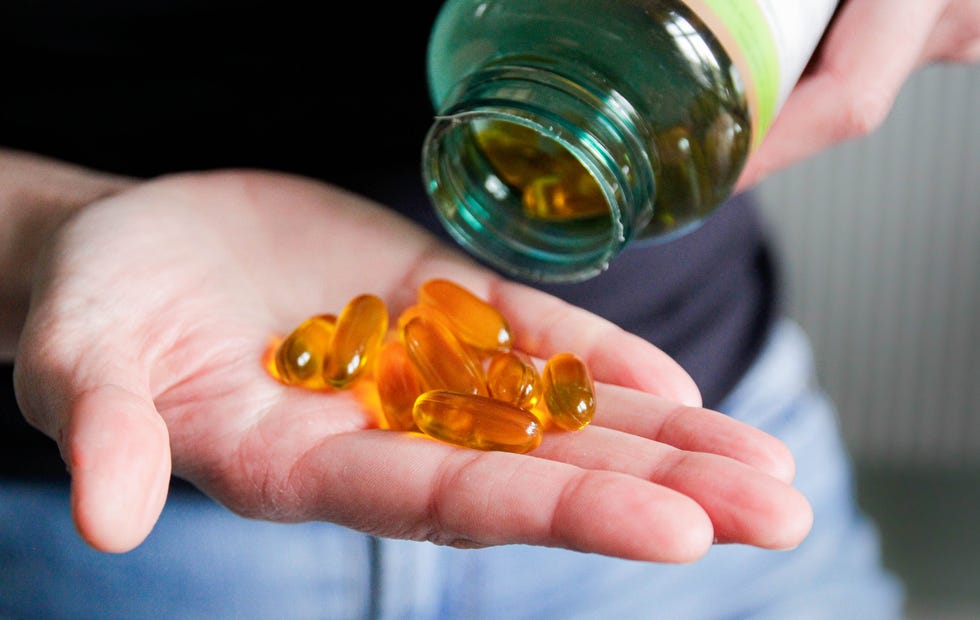The supplement shelves are a crowded place to be right now, and it can be hard to know where to start, what supplements to take and when a food-first approach might be superior. One such supplement is omega-3. While we know omega-3 fatty acids are important for the general population’s health, some recent studies have suggested that runners specifically might benefit from omega-3 supplementation.
‘Omega-3 fatty acids are essential fats that play a vital role in heart, brain, immune and joint health – core areas for anyone, but especially relevant for endurance athletes like runners. They’re best known for their anti-inflammatory properties and support for cellular membrane fluidity, which has direct implications for recovery, oxygen transport, and muscle function,’ says Hannah Trueman, dietetic medicine specialist and lead nutritionist at Body Fabulous.
What does the science say about omega-3 and running?
Indeed, one such study, published in Medicine & Science in Sport & Exercise, investigated the effects of a 12-week programme of omega-3 fatty acid supplementation in amateur runners. Researchers found that the 12 weeks of supplementation improved runners’ omega-3 index (the percentage of total fatty acids in red blood cell membranes), running economy (how efficiently the body uses oxygen while running) and VO2 peak (the highest amount of oxygen an individual can use during intense exercise).
Additionally, a systematic review study (a paper reviewing lots of previous studies) published in Advances in Nutrition also reported potential benefits of fish oil supplementation in athletes, including runners. The researchers identified positive effects on cognition, cardiovascular dynamics (in cyclists), muscle recovery, and proinflammatory cell responses – the body’s initial reaction to injury/infection. While more studies are required to confirm these results, they add to a growing body of evidence suggesting that runners can benefit from omega-3.
‘While research on omega-3s and VO2 max is still evolving, the emerging data is promising and biologically plausible. They are known to support mitochondrial function, critical for efficient cellular energy production, and may enhance endothelial (cells lining the interior surface of your blood vessels) function and blood flow, potentially improving oxygen delivery during exercise. These mechanisms could, in part, explain the observed benefits in aerobic capacity,’ explains Trueman.
She adds that omega-3s have been studied for their potential role in reducing inflammation, improving heart rate variability, supporting joint health and enhancing post-exercise recovery.
According to a 2019 study published in Frontiers in Physiology, running may decrease omega-3 levels, thus increasing the risk of omega-3 imbalance. Researchers examined the blood samples of 257 non-elite runners who consumed no fatty acid supplements and found that those who ran the most weekly miles had the lowest omega-3 index and highest AA/EPA ratio (a measure of cellular inflammation) – two predictors of cardiovascular health. While this is just one observational study and doesn’t guarantee causality, it does suggest that distance running training and its weekly volume could negatively contribute to omega-3 levels.
It’s important, explains Trueman, to look at the bigger picture and to incorporate omega-3 ‘as part of a balanced, nutrient-dense diet’. She says, ‘Antioxidants, such as vitamins C and E, polyphenols and glutathione, play a complementary role in protecting cells from oxidative stress (cell damage), especially during periods of intense physical exertion. Without adequate antioxidant capacity, the increased oxidation of fatty acids during exercise – including omega-3 – may contribute to lipid peroxidation and cellular damage, potentially impairing performance and recovery rather than enhancing it.’
Can runners get enough omega-3 from diet?
‘Many people, especially those following low-fat diets, eating little oily fish or consuming a high omega-6:omega-3 ratio – typical of Western diets – are at risk of suboptimal intake,’ says Trueman. ‘Vegetarians, vegans and athletes with higher metabolic demands may also fall short, particularly of EPA and DHA (both types of omega-3 fatty acids), which are harder to obtain from plant sources alone.’
So, when should you supplement? ‘If oily fish, eg, salmon, mackerel, sardines, isn’t regularly on the menu (two to three times per week), supplementation with a high-quality, IFOS-tested fish oil or algae-based EPA/DHA is worth considering,’ advises Trueman. ‘Dosage and form matter here, so ideally it’s done under guidance to ensure the right balance.’
While cold-water fish such as salmon, mackerel, and sardines supply plenty of omega-3 fats, plant alternatives do exist too, adds Kevin Rail, a health coach, fitness nutrition specialist, personal trainer, and senior contributor at Premium Saunas. ‘Flaxseed, chia seeds, and walnuts give a useful boost. The challenge is getting enough. People who follow strict vegan or vegetarian diets convert plant forms of omega-3 into the active forms less efficiently. Active people who chase a very low fat intake sometimes come up short as well because they focus on lean protein and carbohydrates for energy,’ he says, echoing Trueman.
In Rail’s experience, clients who have added omega-3 fats to a balanced eating plan have often reported less soreness after long runs, quicker recovery, and sharper focus. ‘Food should come first,’ he says. ‘Build regular servings of fatty fish or plant sources into meals. When that is not practical, a high-quality supplement can fill the gap, particularly for runners who log many weekly miles.’
Do make sure you consult your GP if you’re thinking about starting omega-3, though – or any supplement for that matter. It’s important to make an informed decision and to check whether it might interfere with any existing medication you’re taking.

